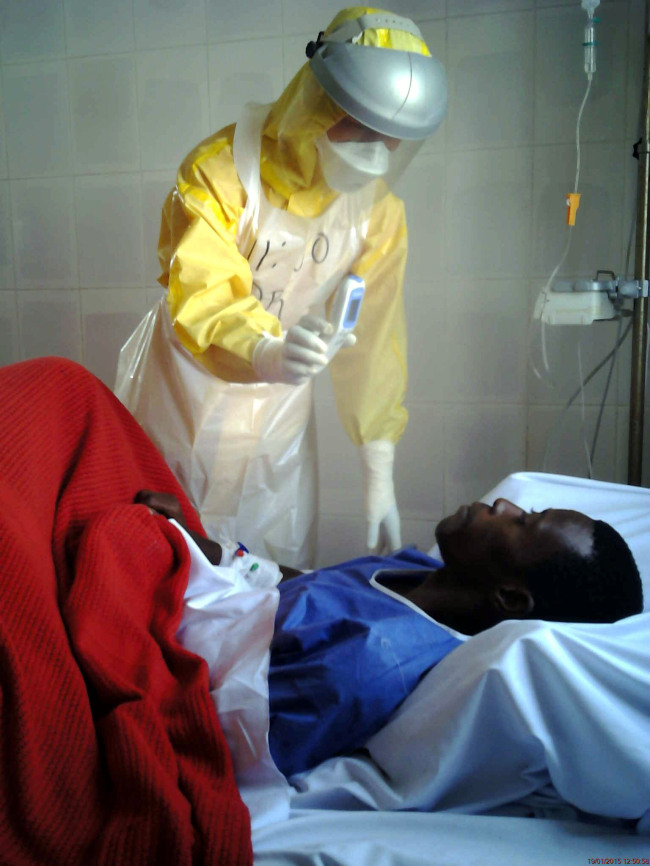Propelled by her lifelong wish to help the needy and thirst for field experience, Hong Na-yeon volunteered to head to Sierra Leone and look after Ebola patients as part of Korea’s first emergency response team in December.
There, the virus’ worst epidemic in history continues to unfold. Dozens of new patients pour every week into the Goderich treatment center in the suburbs of the capital Freetown. The 100-bed hospital, run by Italian relief group Emergency, is hardly able to keep track of patients’ names, let alone their progress. Short of hands, doctors and nurses from around the world work double shifts, scrambling to spare yet another life.
The seemingly never-ending deaths of her patients, many of them small children, traumatized and dismayed the 31-year-old seasoned critical care nurse.
What helped her pull herself together, she says, was the camaraderie of the international staff, her sense of mission and her newfound awareness of the power of life ― even at the edge of death.
 |
Capt. Lee Tae-heon, a Navy surgeon, attends a patient at the Ebola treatment center in Goderich in the suburbs of Freetown, Sierra Leone. (MOFA) |
“Before our duty came to an end, I was taking a final tour around the facility and bumped into a security guard who survived Ebola after being cared for at another center in Lakka,” Hong said in a recent interview.
“I offered my congratulations but he seemed so gloomy. It turned out that he was the sole survivor in his six-member family; his parents, brothers and sisters had all died.
“Hearing that he was slowly recovering and trying to rebuild his life with a new job in Goderich, I felt sad but also gained strength, realizing that we could have a positive impact on the patients and their families.”
Hong’s team ― the first of its kind to respond to an overseas epidemic ― included nine other surgeons and nurses from the military and the private sector. They were discharged on Feb. 15 following a 21-day mandatory quarantine program after serving for about 30 days in the West African country starting Dec. 27.
The outbreak is reported to have killed at least 9,400 people worldwide since last March, according to the World Health Organization. Seoul has pledged $5.6 million to help contain the pandemic through the U.N., the WHO, UNICEF and other organizations.
A third batch of staff is scheduled to begin medical activities at Goderich on Monday following training in the U.K. and elsewhere. Its scale was downsized in line with the ongoing fall in new confirmed cases.
During the interview, most of the seven participants appeared young, vigorous and aglow with a feeling of achievement. All of the members are well and showing no signs of post-traumatic stress disorder, they said.
Lt. Col. Oh Dae-kun, a 39-year-old Army surgeon, said the best day was when the number of deaths was exceeded by the number of those who were dismissed from the hospital.
“Probably all of us must have been quite shocked by the ill patients and some other factors there. But that did not turn into something that overwhelmed us ― I believe that the positive, worthwhile things we went through during our stay outshone the difficult parts,” he added.
The participants had to fight not only the opposition of their families and friends over the risk of contracting the virus, but also rampant public fears of the spread of the deadly disease in order to press ahead with their choice to go.
Health experts and diplomats also expressed concerns over what they called a “panic-like” scare that prompted the government to bar the entry of Guinean officials slated to take part in a telecommunication conference, a Seoul university to revoke its invitation for Nigerian students and Korean Air to temporarily halt flights to Nairobi.
Shin Hyoung-shik, who led the squad and is director for infectious diseases at the National Medical Center in Seoul, said the toughest moment was when a team member was sent for monitoring in Germany after the worker’s finger was scraped by a needle while collecting blood from a patient. The official was eventually declared uninfected and returned home.
“Frankly I initially thought the quarantine scheme was not so scientifically established,” the 51-year-old doctor said.
“Having stayed here for three weeks, however, I came to believe that it is a realistic one that prevents confusion to a certain degree. If I had caught a cold at home after returning, there would have been lots of confusion.”
With a growing need for Korea to take a bigger role in global issues, many team members called for sustained efforts to improve the country’s capability and better prepare for a possible future crisis at home and abroad.
Officials from the foreign, defense and health ministries are also exploring ways to capitalize on the latest mission and contribute to Sierra Leone’s reconstruction, including partnerships with international agencies.
“There have not been sufficient studies on Ebola because there were not many cases around the world,” Shin added.
“Through this experience, we should expand our capacity in terms of both research and treatment to help respond to any future outbreak of infectious, fatal diseases whether they be in Africa or Latin America.”
Oh, the military doctor, echoed Shin’s view, stressing the significance of intra-agency collaboration in tackling a major emergency, and technology in upgrading the country’s response.
“As a soldier, I couldn’t help but think of chemical warfare with North Korea given the security situation on the peninsula and how to improve the operation of mobile hospitals and management of patient data,” he said.
“The WHO’s central role in the Ebola outbreak could also provide lessons to us especially in the wake of the Sewol ferry disaster ― we can take a page from it in setting up our own control tower for crisis management and developing comprehensive manuals and guidelines.”
By Shin Hyon-hee (
heeshin@heraldcorp.com)








